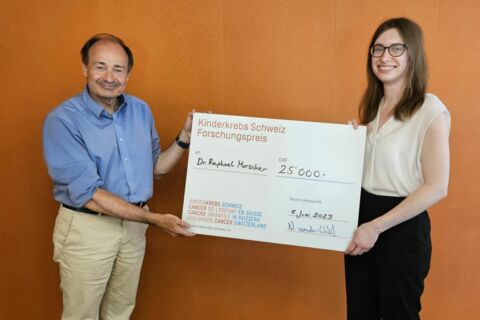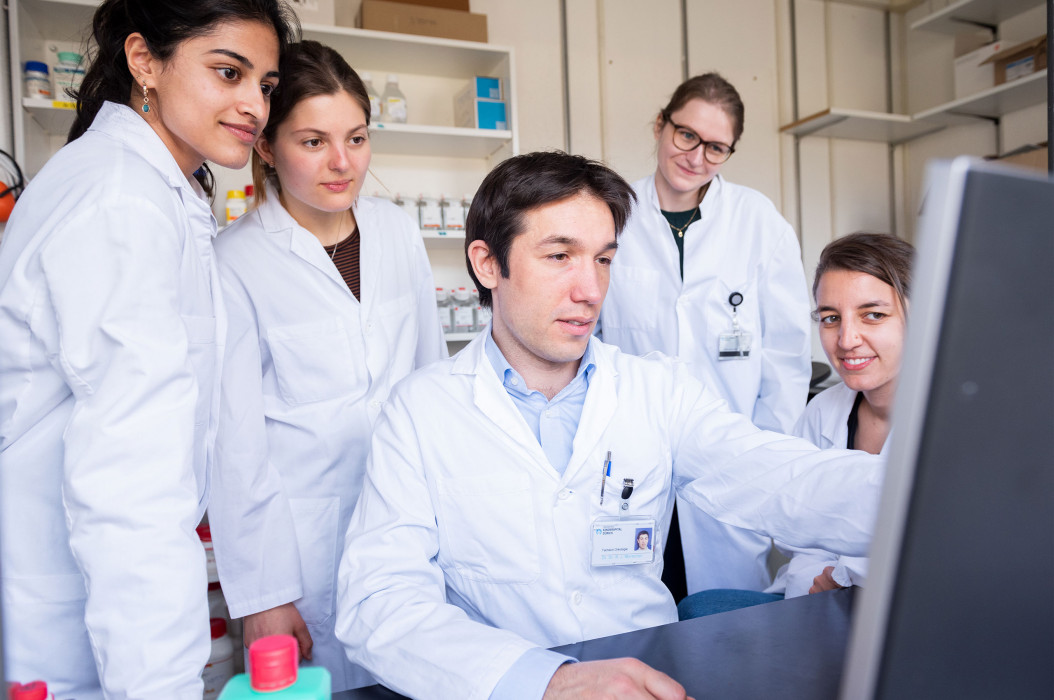
Childhood Cancer Switzerland honours research project
The official award ceremony took place in Bern on 7 June 2023. The award endowed with CHF 25,000 went to Dr Dr med. univ. (A) Raphael Johannes Morscher from the University Children’s Hospital in Zurich. Together with his team, Morscher’s basic research focuses on changes in the metabolism of paediatric tumour cells. He hopes to develop new therapies that specifically target the metabolism of tumour cells and have as few long-term consequences as possible.
With this annual award, the umbrella organisation honours young scientists who engage in outstanding and pioneering projects in basic research at Swiss research institutes or hospitals. Childhood Cancer Switzerland took the opportunity to talk to Dr Raphael Morscher about his work.
Dr Morscher, you investigate metabolism in childhood tumours. What exactly is your research project about?
The metabolism of cancer cells is different from that of normal cells, which means that chemical processes within the cell vary. They grow and divide more quickly, and almost every tumour has a specially altered metabolism due to the many genetic changes. We want to find out what is special about this in order to develop new kinds of therapies. In our project, we mainly focus on folic acid metabolism in childhood tumours. Just as an unborn child needs folic acid for growth during pregnancy, which is why women take folic acid during pregnancy, this is how the cancer cell feels. In this process, the tumour repeatedly changes its metabolism, its “eating behaviour”, in order to become resistant. And this is exactly where our research comes in. If we succeed in finding out about the peculiarities of the eating behaviour of paediatric tumour cells, we can target them with new drugs and prevent them from growing.
Why is it that such innovative research approaches are needed, in particular for childhood cancer?
The primary goal we have in paediatric oncology is still for our patients to survive their cancer. Unfortunately, however, there are still too many children dying of cancer when they suffer a relapse. That is absolutely too many children. To change that, we are in desperate need of new therapy approaches. The second focus is on how we can cure children with as few long-term consequences as possible. It is important to know that a significant proportion of the survivors suffer from medium to severe consequences of their disease and therapy. Basic research is essential for progress to be made here as well.
Where do you see a fundamental need for action?
Currently, the needs of sick children and their families are not sufficiently recognised. That is why it is important to prioritise the issue of childhood cancer – in society, in politics and in research. We have to work on ensuring that children with cancer get the political attention they need. This means taking notice of them, making them the focus of our attention and supporting the progress that is being made worldwide. We are all part of this change, not just our research project. There are many obstacles that can only be overcome if we all work together. This requires researchers, doctors, nurses, patients with families and organisations, such as Childhood Cancer Switzerland, that support us.
What motivates you most in your work?
I just love being in contact with children. Children have a very special way of dealing with their cancer. They live for the moment and can often show joy and give a smile even in the most difficult of situations. I find that touching and it gives me new strength and enjoyment in my work every single day. Our greatest reward would be if it were possible, through the work of our research team, to give the affected children and their families a better life.

Dr Dr med. univ. (A) Raphael Johannes Morscher and his team